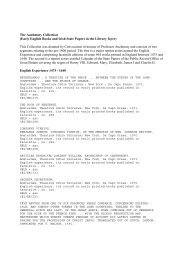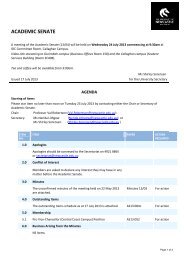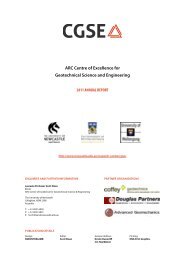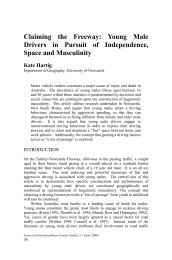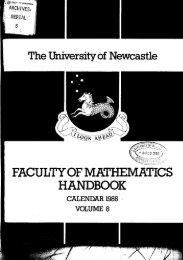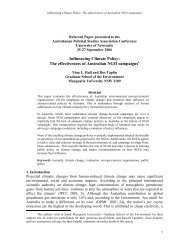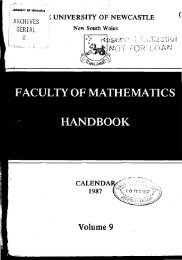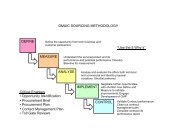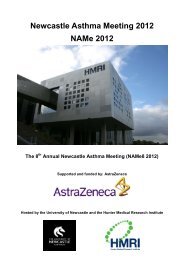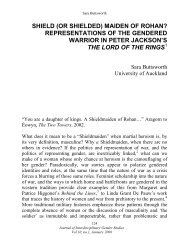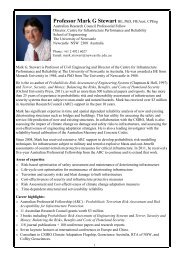n - University of Newcastle
n - University of Newcastle
n - University of Newcastle
Create successful ePaper yourself
Turn your PDF publications into a flip-book with our unique Google optimized e-Paper software.
10 AX AUSTRALIAN LSSGUAGE. THE XINPUXG DIALECT. 11<br />
4. -go, -go-by, -gai.<br />
Tlle 7aeailing <strong>of</strong> these is 'to, <strong>of</strong>, for.' The by Ulay taken as<br />
R rariatioil <strong>of</strong> 130, and, like bo, very little more than an orllament<br />
<strong>of</strong> speech. GO is suffixed to all kinds <strong>of</strong> ilouils to denote 'to,' -gok)y<br />
and sonletinles -go to non-life nouns, in the seilse <strong>of</strong> 'for,' and<br />
gai to life-nonns, in the same sense.<br />
Examples <strong>of</strong> its use are :-Yilly 6ubbulgun killag8by ]runclalgbby,<br />
'where is the paddle <strong>of</strong> that cailoe'? Gaio liindan<br />
10. -no, -ba-no.<br />
This is used after certain verbs <strong>of</strong> nlotioll; as, koroally WB<br />
bon-no, 'go round the camp'; but koroally paigal-bano, 'go<br />
:round the man.' It is also used in such sentences as kagga<br />
klig ballunno, 'carry water from the river.' Its meaning lllay<br />
be given as ' from,' ' arouncl,' ' apart,' and the like.<br />
11. -urrugan.<br />
juna$ bundango, 'I will make a handle for the tomahawk.'<br />
Gaio Euan killan 6ubbogai biagg:ti gerriggai, '1 mil] make<br />
spears for both the boy and the father.'<br />
5. -gal, -jil, -gal-lo, -1la-gi1, -1ia;jil.<br />
rl*<br />
11:e sufixes -go and -gal corresponcl to one anotller in the<br />
seilse <strong>of</strong> 'to' aid 'from.' Inji-go m6 iueails '\:-here are you going<br />
to'? inji-gal 3%-6 is 'where are you coining fronl'? gai kamgil,<br />
' 1 coule fro111 there.' Jil is a variant-form selcion~ used. The<br />
life-nouns aclcl -gal or -jil to the form in -ua; as, paiginna-gal,<br />
'from the man.' Sonletimes -gal takes the fortxi gil-10, and then<br />
has the meaning, <strong>of</strong> 'in coming' o~ ' ~i-hen coming,' This is appa<br />
rntly the agent-nominative addecl to a ~t~ellgthened fornl in -gi<br />
6. -ha.<br />
Ba is simply a locative fornl. Probably there is some connection<br />
l>etween it ancl -bo ancl -by, which may be regarded as<br />
little inore t,l~ail oruaments. It is sometimes found as a termina<br />
tioil to naules <strong>of</strong> places. Its principal use as a noun-suffix is t<br />
s'lrengthen the simple forms <strong>of</strong> life-nouns, auil thus form a nevi<br />
hxse for the additioil <strong>of</strong> the suffixes.<br />
This meails with.' It may be regarcled as a kid <strong>of</strong> possessive;<br />
e.g., yilly noglim-urrugan paigal may be translatecl, 'where<br />
is the dog's master '2 or here is the man with the clog '2 There<br />
is a phrase walngira, 'you also,' which has some conilection wit11<br />
this ; the g is intrusive bet~veen vowels to prevent hiatus.<br />
12. -jim.<br />
Jkmmeans 'nrithout.' Yilly noglim jim paigibl? 'whrl.r<br />
is tile clog without a master '? This is one <strong>of</strong> the rerbal suffixes.<br />
13. -gerry.<br />
The peculiarity <strong>of</strong> this suffix is that, whilst it follox~s tlle rules<br />
<strong>of</strong> the noun-suffixes, it has a verbal meaning. For instance,<br />
kw&g-gerry gai, ' 1 wish it noulcl rain-'; nyail minyug-gel-ry<br />
klig, 'she wants some water'; gai killa-gerry umbin-gerry,<br />
'I woulcl like ta have that house'; yoglim gai inulla-gerry<br />
hulgun-gerry, 'I do not like that woman.'<br />
Dlany <strong>of</strong> these are merely aclditions to the simple nonlillatire<br />
case, ancl are ilot usecl for inflection. To these may be acldecl the<br />
su& -bil, which is usecl to turi1 some nouns into adjectives ; as,<br />
woram, 'sleep,' woram-l>il, 'sleepy.' All terms for relatires are<br />
7. -ma, -bai-ma.<br />
usually strengthened by -j ara and -j al--gun ; e.y.,<br />
Ma is rarely used as a noun-suffix, but, when so usecl, it has the<br />
meaning <strong>of</strong> ' ill' ; e..y., malo dulbagga ballunma, 'you jump<br />
in the river '; the longer form is used with life-nouns ; as, warri!<br />
paigal-baima konno, 'carry this with the man.'<br />
S. -a, -bai-a.<br />
a ' malecousin.' YirabG, g- j. ar-gun<br />
Acljectives generally agree in termination with the lloulls they<br />
qualify ; but it should be noticed they do not follow any hard aid<br />
fat rule. The suffix may be clroppecl from the acljective ; more<br />
frequellt.ly it is dropped from the noun and retaineel with the<br />
This takes the meailiilg <strong>of</strong> 'from,' 'ont <strong>of</strong>.' Examples <strong>of</strong> its use:-<br />
It ura j u na bunclancla, ' pull the haildle out <strong>of</strong> the Lomaharrk ';<br />
bnra monilo 6nan pagilb'aia, 'pull that spear out <strong>of</strong> the man.'<br />
It <strong>of</strong>ten denotes possession ; as, gaiabaia &an, ' I hax-e a spear.'<br />
9. -e, -ai, -ji, -bai<br />
This is the coilverse <strong>of</strong> the particle -a ; it means into.' Ji is<br />
used with nouns eilcliilg in -in ; as, umbin -j i, ' iu the house.' Ba-i<br />
has the i acldecl to t,he streilgtheniilg suffix bn ; as, pagblbai, 'iu<br />
the inan.'<br />
adjective ; and rarely, when the sentence call be understood without<br />
it, it is dropped from them both. On the other hand, this<br />
rule is carried out to an extent that surprises us. For instance,<br />
nubug and nubug-gun mean ' husband ' and ' wife,' but the<br />
longerfom<strong>of</strong> nubug-gunisnubug-jar-gun. Now, Kibbiilbaia<br />
means 'I(ibl$i has,' and to say 'Kibbin has a wife,' would<br />
usually be Kibbinbaiagun nubugjargun. Again, burs ji11<br />
gaiabaia mia would mean ' take the speck out <strong>of</strong> my eye';<br />
where & aiabaia and mia agree in termination, yet mia has the<br />
shorte; non-life form and gaiabaia has the longer life form.



